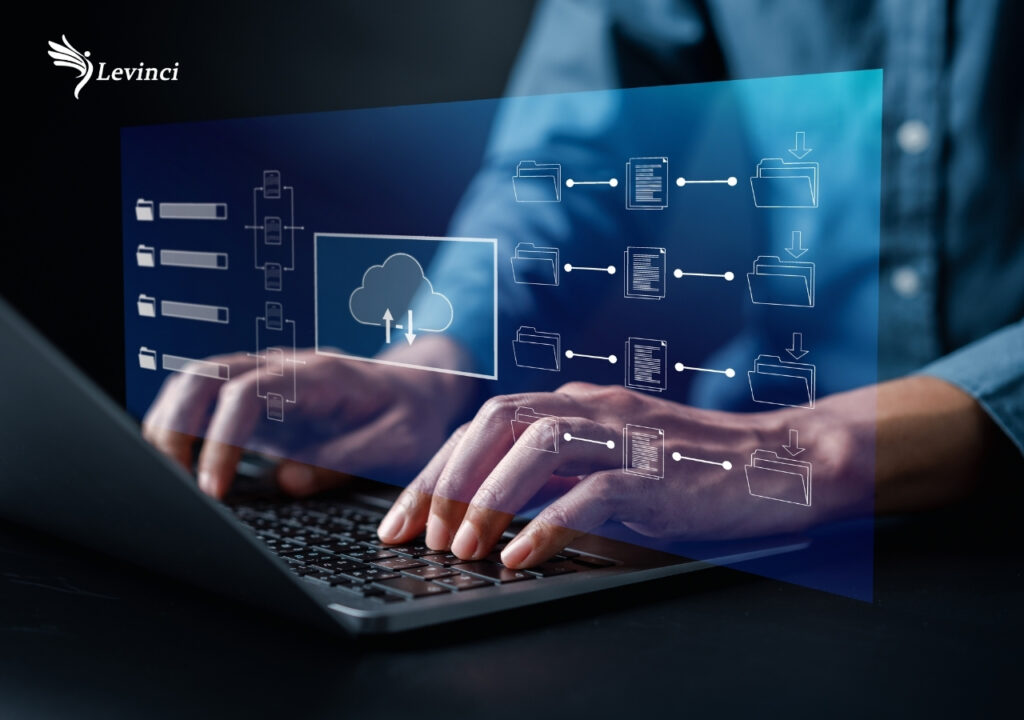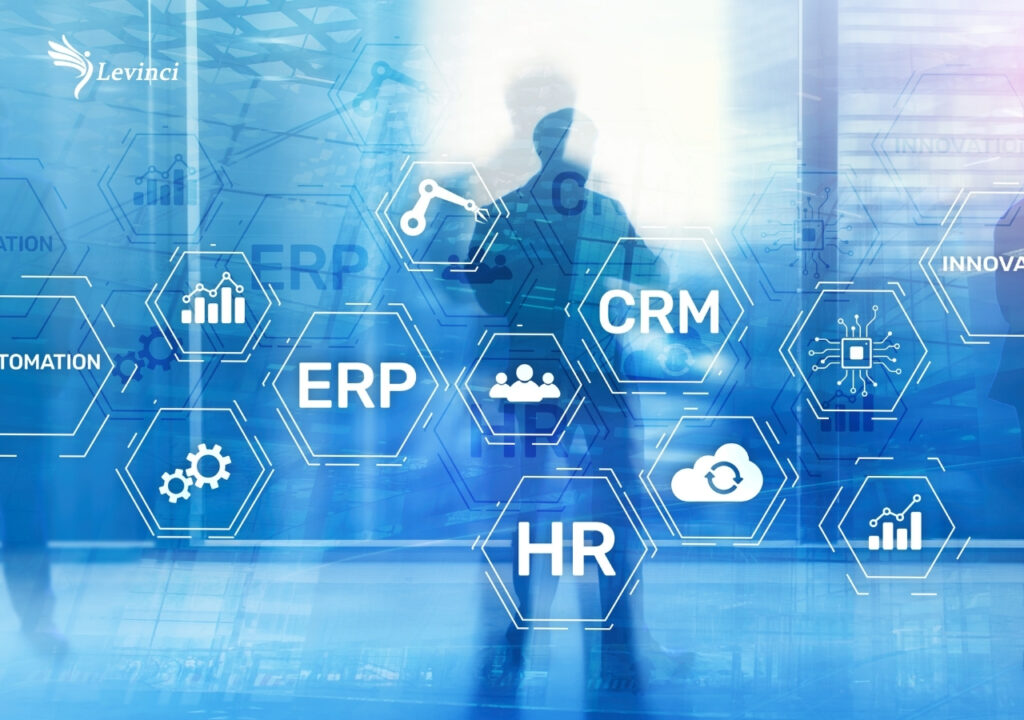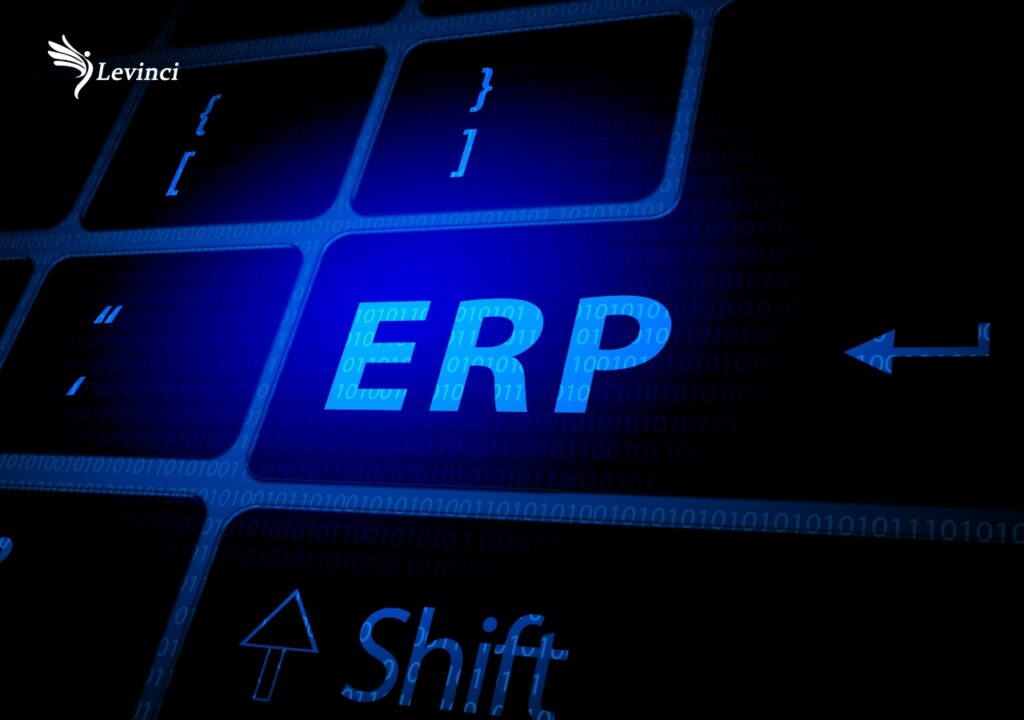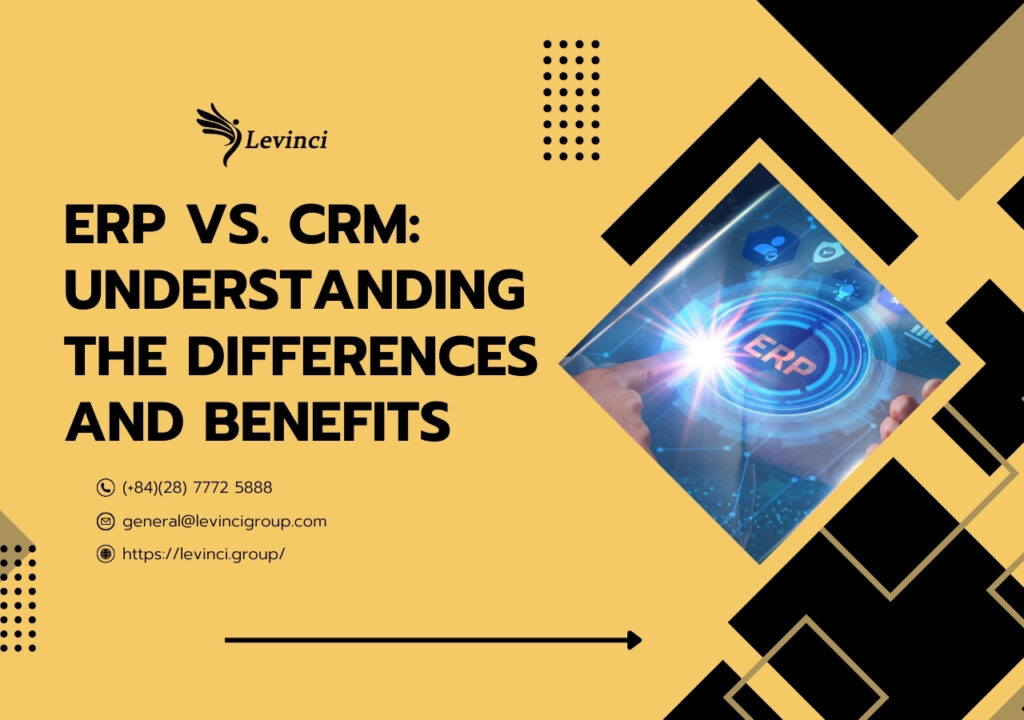In 2025, choosing between ERP and CRM software can define your business’s efficiency and growth in a digital-first world. ERP (Enterprise Resource Planning) and CRM (Customer Relationship Management) systems are powerful tools for digital transformation, yet their distinct roles often spark confusion. Levinci will break down the key distinctions, benefits, and how to choose the best system for your needs.
What is ERP?
Enterprise Resource Planning (ERP) is a type of software used by businesses to manage and integrate the core components of their operations. From financial management to human resources, supply chain operations, production planning, and inventory control, ERP systems centralize data and automate processes, enabling organizations to run more efficiently and make informed decisions based on real-time information.
In simpler terms, ERP is the backbone of an organization’s operational processes, connecting various departments into a unified system that improves overall workflow.

What is CRM?
Customer Relationship Management (CRM) is a type of software designed to help businesses manage and improve interactions with customers, streamline processes, and ultimately enhance customer satisfaction. In essence, CRM systems act as a centralized hub for all customer-related data, allowing businesses to better understand their customers’ needs, track their behaviors, and optimize communication across various channels.
By providing insights into customer preferences, purchasing history, and engagement levels, CRM solutions enable businesses to deliver personalized services and targeted marketing strategies that foster long-term relationships.

ERP vs. CRM: A detailed comparison
When businesses look for software solutions to improve operations and customer relationships, two of the most common systems that come into play are Enterprise Resource Planning (ERP) and Customer Relationship Management (CRM). Although both are essential tools for modern businesses, they serve different purposes and offer distinct functionalities. Understanding the key differences between ERP and CRM is crucial to selecting the right system for your company’s needs.
Scope and purpose
ERP software integrates and automates a business’s core internal processes, creating a unified system for managing operations. Its primary purpose is to enhance efficiency across departments like finance, supply chain, manufacturing, and HR. CRM software focuses on managing external customer interactions, aiming to boost sales, improve customer retention, and optimize marketing efforts. It tracks leads, customer behavior, and support interactions.
ERP is inward-focused, optimizing backend operations, while CRM is outward-focused, enhancing customer relationships. Businesses often need both for comprehensive digital transformation.
Data handling and integration
ERP systems manage large amounts of operational data and integrate it from various departments into a unified system. This includes financial data, inventory information, employee records, and more. By providing real-time data across the organization, ERP systems allow for better resource planning, forecasting, and strategic decision-making.
CRM systems manage customer-specific data, including contact details, purchase history, communication history, and customer preferences. CRM systems allow businesses to analyze this data to provide personalized services and targeted marketing, improving overall customer satisfaction and sales conversions.
Cost and implementation
ERRP is typically more expensive due to its comprehensive scope and complex implementation. Costs include licensing, customization, and training, with mid-sized ERP systems ranging from $50,000 to $500,000 annually, per Gartner. Implementation can take 6-18 months. Generally more affordable, with costs ranging from $10,000 to $100,000 annually for mid-sized businesses. Implementation is faster, often 3-6 months.
ERP requires higher investment and longer implementation, while CRM is quicker and less costly. Levinci’s agile outsourcing model minimizes both cost and time for either system.
Scalability
ERP is highly scalable, supporting businesses from SMEs to global enterprises. ERP systems integrate with supply chain tools, IoT, and AI for advanced functionality. CRM is scalable for growing customer bases, with strong integration into e-commerce, social media, and marketing tools.

ERP or CRM: Which is right for your business?
Choosing between ERP and CRM software in 2025 is a pivotal decision for businesses aiming to drive digital transformation. ERP (Enterprise Resource Planning) streamlines internal operations like finance, inventory, and HR, while CRM (Customer Relationship Management) enhances customer engagement through sales, marketing, and support. The right choice depends on your business’s goals, size, budget, and operational needs.
Choosing ERP If your focus is on optimizing internal processes. ERP is ideal for businesses struggling with inefficient operations, fragmented data, or complex supply chains. Choosing CRM if your priority is improving customer relationships and driving sales. CRM suits businesses aiming to boost lead conversion, personalize marketing, or enhance customer support.

Why choose Levinci for ERP and CRM implementation
Levinci Group, a premier software development and outsourcing provider based in Vietnam’s thriving tech hub, stands out as the ideal choice for ERP and CRM implementation. With expertise in custom ERP solutions that streamline operations and CRM systems that enhance customer engagement, Levinci delivers cost-effective, high-quality results tailored to businesses of all sizes.
The company places a strong emphasis on the integration of ERP and CRM systems, ensuring that both work seamlessly together. This integration eliminates data silos, providing a unified view of operations, customer information, and performance metrics. Levinci’s approach helps technology companies create a cohesive infrastructure that improves decision-making, optimizes resource allocation, and enhances customer service.
Another reason Levinci is an ideal partner for ERP and CRM implementation is its commitment to understanding each client’s unique business processes. Rather than offering one-size-fits-all solutions, Levinci takes the time to conduct a thorough analysis of the business’s goals, challenges, and workflows. This detailed assessment allows the company to design and implement a system that is highly specific to the client’s needs, ensuring that the technology platform is a perfect fit and delivers measurable value.

Conclusion
In conclusion, both ERP and CRM systems offer distinct advantages, making them indispensable tools for modern businesses. ERP systems provide comprehensive solutions to streamline internal operations, optimize resources, and improve decision-making, while CRM systems focus on enhancing customer interactions, driving sales, and improving customer satisfaction.
Understanding the differences and benefits of each system is crucial for selecting the right solution based on your organization’s goals. Whether you choose ERP, CRM, or an integrated approach, investing in the right system can significantly accelerate your business’s growth and digital transformation journey.

